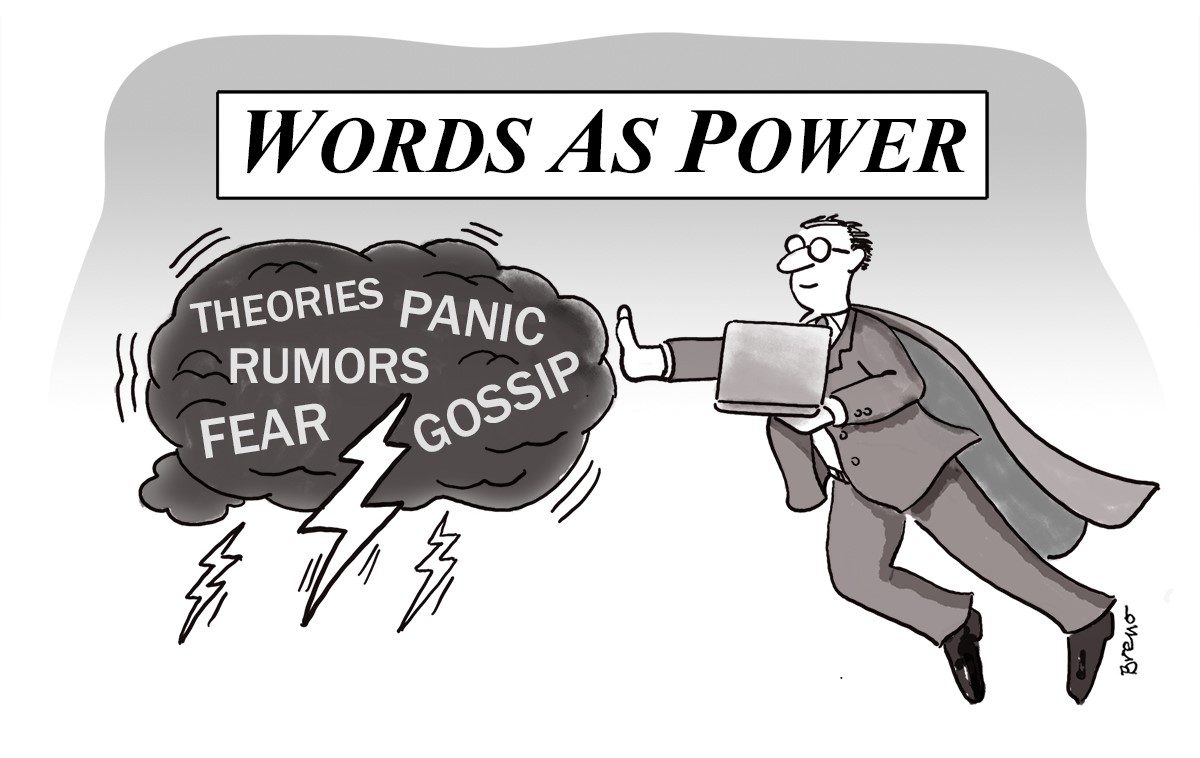 You can fight the coronavirus with your words. Amidst the screaming headlines and clickbait driven posts, communicators can and should use the power of their words to fight the panic that’s spreading, well, like a virus.
You can fight the coronavirus with your words. Amidst the screaming headlines and clickbait driven posts, communicators can and should use the power of their words to fight the panic that’s spreading, well, like a virus.
Here are few tips for communicating with employees, customer and suppliers:
- Nix the adjectives – Using words like “deadly” and “catastrophic” fuels the panic that’s being fed by social media and gossip. I like this advice to journalists from the Poynter Institute: “There is no law that says every time journalists mention the word “virus” that they have to precede it with the word “deadly.” It is true some people die. But we don’t call the traffic jams every day in every city “deadly traffic jams” even though somebody will die every day in traffic…. By now people know this is a serious issue. Stick to the cold hard facts.”
- Choose images carefully – When choosing images for website landing pages, eblasts and blog posts pick those that focus on healthy habits instead of sickness. Showing someone in a mask only fuels the fires. “The public is starting to freak out. Don’t add to it with screaming clickbait headlines and scary generic images.” That’s another piece of advice to journalists covering this story from the Poynter Institute.
- Offer advice. Not emotion– Your employees, customers and vendors are looking for practical information about how this virus is affecting your operations and workplace. They want to know what you’re doing and what they can do. Quinnipiac University, where I’m an adjunct professor, suggested to us that we relax our attendance policies to discourage sick students from dragging themselves to class and infecting others. Trader Joe’s is also encouraging ailing employees to stay home by changing its sick-leave policy during the coronavirus outbreak to allow unwell workers to get reimbursed.
- Address the status of upcoming events – The people who depend on your business need to know what you’ll be doing about upcoming events. Are you cancelling? Considering cancellation? Going forward? When will you make those decisions if you haven’t already? Temple Emanu-El in New York is staying open for services, which they state specifically on a landing page dedicated to “Covid-19 Preparedness.” The page is featured prominently on their homepage. It offers alternatives to those who are nervous about coming to worship (good “customer” relations).
- Provide scheduled updates – Now is the time to demonstrate that your business cares about its employees, customers and vendors by serving as a source for clear-headed information. Establish a firm schedule of information-packed communications through eblasts, social media, blog posts, podcasts or YouTube videos. Sticking to that schedule will position you as a dependable source of credible and useable information.
- Make worker safety a priority – Demonstrate your employee-centered culture by providing workers with information about what you’re doing to make their workplace safe. Do this through individual emails to workers, communications on your intranet and YouTube videos by your leaders. Intel also shares this information with their suppliers and visitors and has been updating it almost daily.
- Communicate what you’re doing to keep the workplace safe for all – Right now many businesses are opting to stay open. The smart ones are letting people know what they are doing to keep visitors safe. Here’s part of a statement by Disney World about what they are doing to keep the parks clean. “…the Disney Parks division has had to enact heightened sanitation measures across the parks, including increased availability of hand sanitizer stations throughout Disneyland Resort and also at Walt Disney World.”
As communicators, we are all striving to showcase our companies as thought leaders. Now is the time to do it, but in a responsible way. Make sure all communications provide usable and not emotion messages. In the rush to deal with this virus, do not get so carried away that you fan the flames of fear.
When I graduated Boston University’s School of Communications it was during The Age of Aquarius. We thought it was within our capabilities to make the world a better place. Our professors reflected those times, cautioning us to use to power of our words for The Good. They were our Superpowers. Those were heady days and I, for one, bought into that. As the internet catches fire with fear and emotion, it’s bringing those words back to me. Communicators’ words are their Superpowers. Now is a good time to use those Superpowers wisely.




